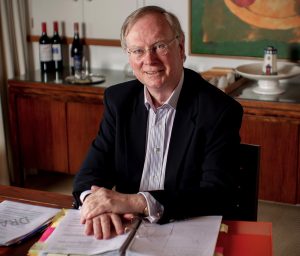The third in a series of articles in which Hugh Fraser writes about contemporary shire council matters in the run-up to local government elections. Follow his work on the council and in the community at hughfraser-morningtonpeninsula.com
IN August, shire councillors adopted yet another plan to address climate change. The council’s press release referred to it as an “ambitious” climate emergency plan. This is the third plan since 2015 when the council declared for carbon neutrality in Mornington Peninsula Shire’s own operations by 2021.
At that time in 2015, the council abandoned the use of its longstanding expression Committed to a Sustainable Peninsula. A carbon audit of the council’s carbon footprint revealed for the first time that no measurable reduction in this footprint had been achieved, despite years of what shire management described as “embedded” – but vacuous – principles of sustainability in its day to day operations.
With 2021 just around the corner, the council now knows that carbon neutrality – decarbonisation – cannot be achieved by practical projects alone. Carbon offsets will be required – at a cost to the shire council and ratepayers.
This is a disappointing result for a council that has shown leadership in local government at home and abroad over many years through its membership of the International Council for Local Government Environment Initiatives (ICLEI) and as an advocate for decarbonisation. I recently represented ICLEI and local government at the 2019 United Nations Climate Change Conference in Madrid, Spain, also known as COP25 (and paid my own way).
The council – and shire management – has participated in this dialogue since the 2007 COP in Bali.
Local government working in this international community – the subnationals – by exchanging ideas and dialogue has led debate and practical decarbonisation initiatives while nation states have been bickering and backsliding.
But all that changed at the Paris 2015 World Environment Conference when 196 nation states of the world, generating 98 per cent of the world’s greenhouse emissions, agreed to keep global warming to 2 degrees above pre-industrial levels – but aim for 1.5 degrees.
Or rather, we thought it had all changed. President Donald Trump has acted to take the United States, which runs on undiminished carbon, out of the Paris Agreement by November 2020 (on the day after the presidential election).
In our own backyard, regrettably – and despite practical projects like upgrading street lighting to energy efficient LEDs, installing solar panels, and facilitating financial arrangements for the private sector to invest in solar energy – the shire council’s operational carbon footprint has not materially reduced since 2015 when councillors declared for operational carbon neutrality by 2021.
Opportunities to do so have been lost.
In September 2015, councillors agreed to close the Rye landfill by 2018 (but retain the waste transfer station for resident drop-offs). This would have just about halved the shire council’s landfill emissions by 2050 but the decision was reversed in the last days of the 2012–16 council. The appalling result is that the council’s landfill emissions will now double by 2050.
It gets worse. The council’s carbon footprint is being enlarged by its decision to use gas to heat the pools of Yawa Aquatic Centre at Rosebud. There was no exploration by the council of renewable energy alternatives including the possibility of using the hot water aquifer under the peninsula (as accessed by Peninsula Hot Springs at Fingal).
In the wider community, opportunities for reducing carbon consumption have not been approached in an innovative way. One lost opportunity was a solar farm on the council’s former landfill at Truemans Road. Onerous expressions of interest conditions put up by shire management stopped the project advancing past first base.
A solar farm would have helped meet the huge summer holiday increase in electricity demand, particularly on the southern peninsula. Instead, diesel generators like those used in developing economies now dot the southern peninsula to meet this demand – facilitated by council planning.
So what of the council’s new Climate Emergency Plan? Are the double standards to continue? Is it all window dressing or is the council serious about decarbonising its own operations as well as those in the wider community?
With key targets and strategic aims in the Climate Emergency Plan, the council now has another opportunity to deliver decarbonisation in the shire council’s own operations as well as in the wider community.
As a society we cannot continue our damaging consumption of carbon – coal, gas and petrochemical processes and products – which heats the environment and air that we all breathe as well as warming and expanding the oceans.
The atmosphere and oceans do not stop at the boundaries of the nation states – they are something every living creature and ecosystem on the planet shares. What we consume and burn in coal, gas and petrochemical processes and products also consumes our planet and its environment – and us.
The council must now rigorously guide the implementation of the Climate Emergency Plan. It’s our last gasp to achieve meaningful decarbonisation.
Hugh Fraser is Nepean Ward councillor on Mornington Peninsula Shire Council
and a candidate in the upcoming local government elections.
Hugh is a barrister by profession and was a member of the Victorian Legal Services Board and its finance and investment committee 2007–10. He was
first elected to the shire council in 2012 as councillor for Nepean Ward (representing Blairgowrie, Portsea, Rye, Sorrento and Tootgarook) and again in 2016. On the council he served as a member of the Audit Committee 2012–19 and has taken a close interest in shire business practices, capital works for Nepean Ward, rates reform, waste disposal, climate change, and heritage. He has been a member of Parks Victoria’s Point Nepean National Park Advisory Committee since 2018 and is a shire delegate to Friends of Lospalos (Timor-Leste).
Email: hwfraser@vicbar.com.au
or mobile: 0418 379 335;
hughfraser-morningtonpeninsula.com
Written and authorised by Hugh Fraser,
12 Michael Street, Rye 3941
